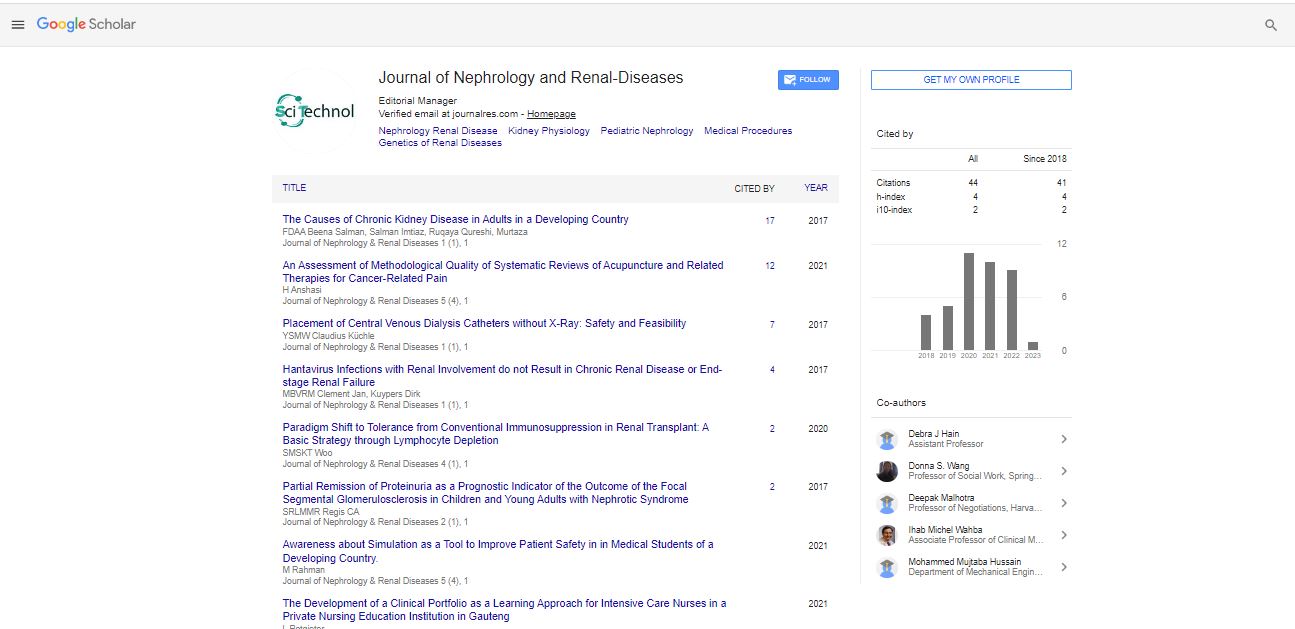Opinion Article, J Nephrol Ren Dis Vol: 7 Issue: 2
Recognizing the Pathophysiological Complexities of Renal Diseases
Oleg Winquist*
Department of Medicine, Vanderbilt University Medical Center, Nashville, Tennessee, United States of America
*Corresponding Author: Oleg Winquist,
Department of Medicine, Vanderbilt
University Medical Center, Nashville, Tennessee, United States of America
E-mail: olewinq@vanderbilt.edu
Received date: 22 May, 2023, Manuscript No. JNRD-23-106999;
Editor assigned date: 25 May, 2023, PreQC No. JNRD-23-106999 (PQ);
Reviewed date: 08 June, 2023, QC No. JNRD-23-106999;
Revised date: 15 June, 2023, Manuscript No. JNRD-23-106999 (R);
Published date: 22 June, 2023, DOI: 10.4172/2576-3962.1000032
Citation: Winquist O (2023) Recognizing the Pathophysiological Complexities of Renal Diseases. J Nephrol Ren Dis 7:2.
Description
Renal diseases encompass a wide range of conditions that affect the structure and function of the kidneys. These diseases comprise a diverse group of disorders that can lead to impaired kidney function and ultimately, renal failure. These conditions can arise from various etiological factors, including immune-mediated inflammation, metabolic disturbances, vascular abnormalities and genetic mutations.
Glomerular diseases involve injury to the glomeruli, the intricate network of capillaries responsible for filtration. Mechanisms underlying glomerular diseases include immune-mediated injury, deposition of immune complexes, complement activation and podocyte dysfunction. Conditions such as glomerulonephritis, diabetic nephropathy and lupus nephritis can result in glomerular inflammation, disruption of the filtration barrier and proteinuria. Activation of inflammatory pathways, release of cytokines and proliferation of mesangial cells contribute to glomerular injury and subsequent renal dysfunction.
Tubulointerstitial disorders involve injury to the renal tubules and interstitium, which play a vital role in reabsorption and secretion processes. Ischemia, toxins, infections and autoimmune processes can lead to tubular injury, inflammation and interstitial fibrosis. The resulting tubulointerstitial damage impairs the kidney's ability to maintain fluid and electrolyte balance, leading to impaired renal function. Conditions such as acute tubular necrosis, drug-induced nephropathy and interstitial nephritis manifest as tubular dysfunction, electrolyte imbalances and reduced urine-concentrating ability.
Vascular abnormalities contribute to the pathophysiology of several renal diseases. Renal artery stenosis, thrombotic microangiopathies and renal vein thrombosis are examples of conditions that disrupt renal blood flow and oxygenation, leading to ischemia and tissue damage. Hypertension, a common complication of renal disease, can further exacerbate vascular dysfunction by promoting renal vasoconstriction and remodeling. The resultant ischemia and altered hemodynamics contribute to progressive renal injury and impaired renal function.
Genetic mutations can predispose individuals to various renal diseases. Autosomal Dominant Polycystic Kidney Disease (ADPKD), alport syndrome and cystinuria are examples of genetic renal disorders. Mutations in genes encoding structural proteins, transporters or signaling molecules can disrupt normal renal development, function and repair mechanisms. The progressive accumulation of cysts, glomerular basement membrane abnormalities or impaired ion transport leads to renal damage and dysfunction.
It is important to note that renal diseases often involve complex interactions between different pathophysiological processes. For instance, glomerular diseases may lead to secondary tubulointerstitial injury due to proteinuria and subsequent inflammation. Vascular abnormalities can result in ischemic tubular damage and glomerular injury due to altered hemodynamics. Understanding these interconnections is important for comprehensive diagnosis and management of renal diseases.
Advances in understanding the pathophysiology of renal diseases have facilitated the development of more targeted diagnostic and therapeutic approaches. Biomarkers of glomerular or tubular injury, immunological markers and genetic testing have improved diagnostic accuracy. Targeted therapies, such as immunosuppressive agents, renin-angiotensin-aldosterone system inhibitors and specific gene therapies, have demonstrated the potential for minimizing disease progression and preserving renal function. Precision medicine approaches that consider individual patient characteristics and underlying pathophysiology are gaining importance in the management of renal diseases.
Conclusion
The pathophysiology of renal diseases is multifaceted, involving intricate interactions between immune-mediated processes, metabolic disturbances, vascular abnormalities and the genetic factors. Understanding these underlying mechanisms is important for accurate diagnosis, risk stratification and targeted therapeutic interventions.
 Spanish
Spanish  Chinese
Chinese  Russian
Russian  German
German  French
French  Japanese
Japanese  Portuguese
Portuguese  Hindi
Hindi 
